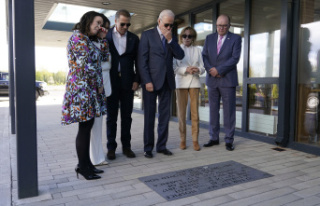It's a banal quarrel in a market that has turned tragic, against a backdrop of inflation and a dispute with the police. Nizar Issaoui, a 35-year-old former professional football player, died on Thursday April 13 of his injuries after setting himself on fire in front of the police district of the locality of Haffouz, in the Kairouan region (center). A few days earlier, the sportsman had filmed himself denouncing the injustices committed by the “police state”. A video widely shared on social networks in which he ended up setting fire to his clothes.
According to witnesses, the police intervened when the man threatened to set himself on fire. "He lit his lighter just after the police threw tear gas," Bassem Issaoui, cousin of the victim and head of the consumer defense organization in the region, told Le Monde. Seriously injured, the former footballer, father of four, died at the trauma and burns hospital in the suburbs of Tunis, where he had been transferred.
Hundreds of self-immolations since 2010
The origin of the drama dates back to a fight that broke out between residents of Haffouz and fruit and vegetable merchants. In question, the particularly high price of a kilo of bananas on one of the stalls, more expensive than that fixed in March by the Tunisian authorities. Embroiled in the argument, Nizar and his brother were charged with "criminal association" by the police. “His brother was arrested for a few days and Nizar went into hiding when he learned he was wanted. He couldn't even see his children anymore,” said Bassem Issaoui. “I will be tried and charged at the same time. I condemn [myself] to death by immolation. The session is closed, "said Nizar Issaoui on his Facebook page, a few moments before the tragedy.
His gesture is reminiscent of that of Mohamed Bouazizi, a street vendor who also had disagreements with the police before setting himself on fire on December 17, 2010, the date of the outbreak of the Tunisian revolution and the "Arab Springs". Since then, suicides by immolation in Tunisia have been numerous. In 2019, a dozen people killed themselves, according to the local press. Self-immolations have not been the subject of official statistics since the last peak in 2016 – there were then up to 100 cases per year – in a context of economic and political crisis.
In 2023, inflation has reached record levels in the country, exceeding the 10% mark for several consecutive months. In the food sector, prices have already increased by an average of 15.7% over one year, with a very significant increase – up to 34% – in the prices of meat, eggs or edible oils. At the beginning of March, the Tunisian government announced a measure aimed at controlling the price of bananas and apples, a decision deemed insufficient in the face of the general increase, especially since these products are imported and taxed by the State.
In Haffouz, more than 30% of the population lives below the poverty line, according to the latest figures published by the National Institute of Statistics. During the night of Thursday to Friday, clashes broke out between residents and police officers present in large numbers after the announcement of the death of Nizar Issaoui. "Our family is calling for calm, but many people are outraged," Bassem Issaoui said on Friday, when the situation was still tense a few hours before his cousin's funeral.












